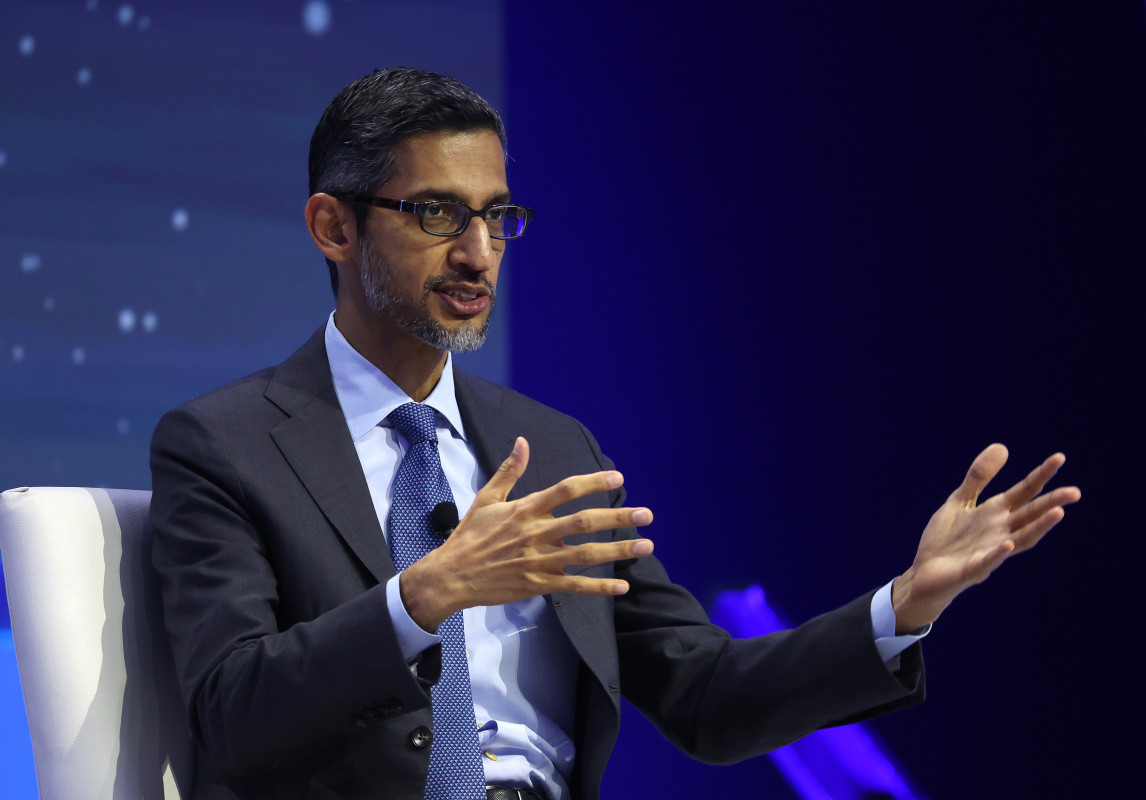
While Google is a search engine Goliath, the performance of the stock of its parent, Alphabet, has trailed that of its large-cap technology peers because of concern that artificial intelligence will reshape the search market.
There's little debate that AI apps are changing how people consume and digest information — but there's also little to suggest that Alphabet's search dominance is over.
Alphabet's market share remains intact despite the widespread availability of large language models for searching and creating content, including OpenAI's ChatGPT and Microsoft's Bing.
Nevertheless, the risk that AI could cut into Google's lead has led to analysts to revisit their opinions and update their stock-price targets.

Google rides AI tailwinds
ChatGPT became the fastest app to reach one million users after its launch in December 2022. Since then, everyone has been considering how AI could transform how businesses and people engage with information.
Individuals are using generative AI apps to find and create more relevant insight, banks are using it to hedge risks, retailers are evaluating whether it can stop theft, and the military is studying how it may affect the battlefield.
Related: Apple's AI plans reportedly could involve a partner like Google
The potential for AI to unlock better outcomes by intelligently crafting responses from previously siloed datasets has sparked a tidal wave of investment into training and running increasingly more robust AI solutions.
Those solutions will likely affect the search market but might not derail Google's dominance.
For example, despite ChatGPT and Microsoft's AI solutions, including Bing and Copilot, being readily available, Google appears to have insulated itself from these challengers via its solution, Gemini (formerly Bard).
According to Similarweb, over the past six months, the market shares of ChatGPT and Microsoft search and AI chatbot have inched up 0.32% to 0.14% to 1.84% and 1.44%, respectively.
Meanwhile, Google’s market share outside China has remained at nearly 92%.
The ability to maintain share may stem largely from Google working quickly to launch Gemini and deploy AI tools for Google Cloud customers. These include many of the world's largest companies, which use Alphabet's servers and software to store and analyze data.
Alphabet's (GOOG) year-over-year revenue growth over the past four quarters is 3%, 7%, 11%, and 13% and its earnings-per-share growth has changed by -11%, 17%, 42%, and 42%.
The improving top-and-bottom-line growth rates suggest that Alphabet's business remains on solid ground, with ongoing advertising interest across its platform, including traditional search and YouTube, and increasing investments by Google Cloud customers to train and run their AI initiatives.
Last quarter, Alphabet's $86.3 billion of revenue outpaced Wall Street estimates by more than $1 billion, while its $1.64 a share of earnings beat forecasts by 4 cents.
Importantly, revenue at Google's Search & Other business segment increased 12.7% year-over-year to $48 billion and YouTube ads jumped 15.6% to $9.2 billion.
Analyst says Google search fears are 'overblown'
Of course, anything can happen, but Wedbush Securities analysts say that worry about a structural shift in search away from Google is misplaced.
More AI Stocks:
- Analysts revamp C3.ai stock price targets after earnings
- Analyst updates stock price target for Super Micro Computer
- Analysts unveil new Nvidia price targets ahead of 'AI Woodstock' conference
"We acknowledge the near-term uncertainty associated with a broader [Search Generative Experience] rollout but have increasing conviction that over the longer term SGE will provide ample monetization opportunity on par with, or potentially above, traditional Google search," Wedbush analysts Scott Devitt, Dan Ives, Michael Gerbino and Matthew Weiss recently wrote to institutional investors.
The analysts conducted searches on PCs and mobile devices across Alphabet's AI and non-AI tools. They found that AI results with ads generally boasted a similar number of ads to non-AI search results.
Currently, those ads are largely above or below the AI-generated results, but over time, Wedbush suspects that Google will increasingly allow ads to be embedded within results, improving their value to advertisers, and opening the door to more revenue opportunities.
There's also a big possibility that Alphabet can produce meaningful revenue by licensing its AI to other companies, such as Apple.
In March, reports surfaced that Apple was considering a deal to have Google's AI power the AI solutions within future Apple device upgrades. Given the more than two billion active iPhones, iPads, Macs, and other Apple consumer electronics globally, an agreement could be worth big money.
"We think Google remains a clear generative AI beneficiary," wrote Wedbush. "Google’s core advertising business is well positioned with growth set to accelerate this year against a strong digital advertising backdrop. Google remains a dominant digital advertising business with healthy underlying growth and significant optionality related to AI across both its advertising and cloud segment."
The opportunity to overdeliver on AI versus expectations could mean that Google's stock heads higher, especially if investors start valuing the company as they have in the past. Over the past five years, Alphabet's shares have boasted an average price-to-earnings multiple of 22. Currently, it's about 19.
If earnings rise thanks to cost-cutting, including layoffs during the bear market and increasing sales, investors could be rewarded with gains. As a result, Wedbush upped its stock price target to $175 from $160, adding Alphabet to its "best ideas list."







